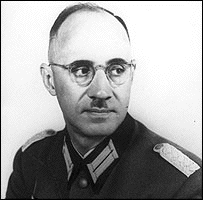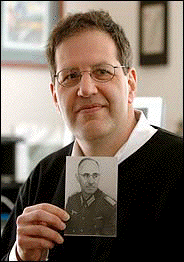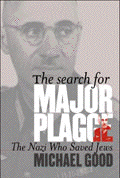
(1897-1957)

[Photo
Credit: Yad Vashem]
|
Major
Karl Plagge served as an officer of the Wermacht
in Vilna (Vilnius) from June 1941 to June 1944.
While stationed in Vilnius he was in charge of a
repair facility for military vehicles (HKP 562),
where hundreds of Jews worked. According to the
brutal decimation policy adopted by the SS in
occupied Lithuania, the first to be slated for
extermination were the "unproductive" Jews.
Employment at Plagge's HKP unit thus offered a
chance for survival. Plagge treated his workers
well, and included many people who were not
qualified as mechanics to work there in order to
save them from deportation; among the Jews of
Vilna it was known that if one wanted a chance
to survive, the only option was to work in
Plagge's plant. In the last days of June 1944,
on the eve of the German evacuation of Vilnius,
Plagge assembled his Jewish workers and warned
them in thinly veiled language that they were
going to be handed over to the care of the SS.
Some managed to escape and/or hide and some 200
survived. Karl Plagge died in 1957 and was
posthumously recognized by the Yad Vashem
Committee on July 22, 2004.
[Source:
Yad Vashem]
|
60
Years Later, Honoring the German Army
Maj. Karl Plagge,
an Unlikely Hero of the Holocaust
By ALISON
LEIGH COWAN
March 28, 2005
DURHAM, Conn., USA,
March 24, 2005 -- It took 60 years before they found each
other and amassed enough proof to overcome skeptics. But
a handful of families who survived the Holocaust are
responsible for having a German army officer recognized
for saving hundreds of Jews from extermination during
World War II.
|

|
..
|
|
Dr.
Michael Good
of Durham, Connecticut, USA, with a photograph
of Maj. Karl Plagge, a German officer to be
honored on April 11, 2005 in Jerusalem.
[Photo:
Douglas Healey]
|
Leading the campaign has been Dr. Michael Good, a family
physician in Connecticut. He says that the officer,
Maj. Karl Plagge, saved his mother and seven of
her relatives, a story he tells in a new book called "The
Search for Major Plagge."
He and members of
the other families who persuaded Israel to award the
major its highest honor for righteous gentiles say their
unlikely hero, who died in 1957 at age 59, took some
1,000 Jews from the Vilna ghetto to the relative shelter
of a nearby forced labor camp one week before the ghetto
was liquidated in September 1943. The families say that
at the camp, which he commanded, Major Plagge sought to
keep those prisoners beyond the reach of the SS death
squads.
Their campaign to
honor Major Plagge was not an easy one. Yad Vashem, the
authority Israel created to remember the Holocaust, twice
rejected their requests with little
explanation.
Now, on the
strength of additional evidence submitted in a third
application last year, Yad Vashem will honor the major on
April 11 in Jerusalem. His name will be inscribed on a
garden wall, not far from trees already honoring others
who risked their "lives, freedom or safety" to save Jews,
like Oskar Schindler and Raoul Wallenberg.
Of the 20,205
honorees to date, only 410 are German, and only a few
were German soldiers, say Yad Vashem
officials.
By all accounts,
the ceremony would not be taking place if Dr. Good had
not grown curious six years ago how his parents had
survived those years, when so many other Jews from Vilna
had perished. (The city, which changed hands several
times, was called Vilna by the Russians and Vilnius by
the Lithuanians.)
Dr. Good, 47, is
the first to admit that he never had much interest in his
heritage before that. Accents ran thick in his childhood
home in West Covina, Calif. The furniture had hiding
places for "emergencies," and his father spoke 10
languages, but was baffled by baseball.
All he wanted as a
boy, Dr. Good said, was to be a "regular American."
Eventually, he married Susan Possidente, a Roman Catholic
nurse, moved to Connecticut, raised a son and daughter
and avoided synagogue.
His curiosity was
piqued during a trip to Vilnius with his parents in 1999.
They visited the work camp where his mother had been a
prisoner and she told him of the German officer who ran
the camp, a man, she said, who had saved her life. The
more he asked his parents, "How is it I'm alive?" the
more he realized how fortunate he was that "somebody in a
crucial moment helped them in their time of
need."
 Through
e-mail, Dr. Good found other residents of the work camp
who corroborated his family's stories, and volunteers who
combed German archives. (Their findings are at
t h i s l i n k
and became
the germ of the book.) In the process, he learned far
more about his parents' lives during those very dangerous
years. He learned that his father, Wowka Zev Gdud, now 80
and known as William, escaped a Nazi-led execution squad
and spent the rest of the war hiding in a
forest.
Through
e-mail, Dr. Good found other residents of the work camp
who corroborated his family's stories, and volunteers who
combed German archives. (Their findings are at
t h i s l i n k
and became
the germ of the book.) In the process, he learned far
more about his parents' lives during those very dangerous
years. He learned that his father, Wowka Zev Gdud, now 80
and known as William, escaped a Nazi-led execution squad
and spent the rest of the war hiding in a
forest.
His 75-year-old
mother, Perela Esterowicz, who now goes by Pearl, was
more fortunate. After two years in the Vilna ghetto, she
was among 1,000 Jews who were transferred at Major
Plagge's urging to the work camp, on Subocz Street on the
outskirts of the city. One week later, the Germans purged
the ghetto.
Though the camp's
official role was fixing military vehicles, Major Plagge
found jobs for all. Dr. Good said his grandfather Samuel
Esterowicz "couldn't change a light bulb," but was deemed
"essential" by Major Plagge, and his mother mended
soldiers' socks.
Though Dr. Good
found no evidence that Major Plagge openly defied the SS,
he said the major subverted many of their lethal
intentions by insisting that he needed Jewish prisoners
for the war effort.
Survivors recalled
that Major Plagge once took an ailing Jewish internee to
a hospital, exposing himself to great risk, and staged a
beating of two Jewish prisoners who had smuggled food
into the ghetto to keep the SS from handling the
matter.
After one vicious
act, in which the SS took 250 of the camp's children to
be killed, Major Plagge was heard expressing
disappointment with the latest "achievements of his
fellow Germans," according to Mr. Esterowicz's
unpublished memoirs.
Survivors say Major
Plagge performed one last heroic act as the Russians
pushed the Germans out of Vilna in July 1944. In the
presence of an SS officer, he informed the inmates that
they "will be escorted during this evacuation by the SS,
which, as you know, is an organization devoted to the
protection of refugees. Thus, there's nothing to worry
about."
William Begell, a
New Yorker who heard the remarks as a 17-year-old
prisoner, took them as a veiled warning to flee or hide -
anything but wait for the evacuation. Mr. Begell jumped
out a window and escaped. Pearl Esterowicz and about 100
others hid in a cramped space underground until the
Germans left.
After Dr. Good
learned that Major Plagge had no children he could thank,
he resolved to push for his recognition by Yad Vashem. He
said it took awhile for Yad Vashem to accept that Major
Plagge put himself in harm's way, since the German
military endorsed using Jewish slave labor to support the
war effort.
An added reason for
skepticism, say those involved, was Major Plagge's
membership in the Nazi Party from 1931 to 1939. Dr. Good
said his research showed that the major, who had been a
prisoner of the British during the First World War,
became disillusioned with the party after Hitler's rise.
In the late 1930's, he became the godfather of a boy who
was part Jewish.
Like thousands of
former Nazis, Major Plagge was put on trial after the
war. Transcripts found from Major Plagge's 1947 trial
show that former prisoners and subordinates vouched for
him. But he insisted on being classified as a "mitlaufer"
or "fellow traveler," a label that implied some
complicity.
Dr. Good said he
had concluded that Major Plagge spent the rest of his
life guilt-ridden for not having done more than he
did.
.
